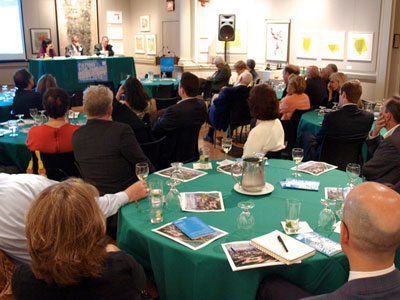

October 3rd, 2012
6:30pm - 9:00pm
The Century Association
7 West 43rd Street, New York, NY, United States

According to TIME Magazine, Mayor Richard M. Daley “is widely viewed as the nation’s top urban executive.” As a city CEO, he earned a reputation - both in Chicago and across the U.S. – for implementing innovative, community-based programs have tackled many of the fundamental challenges facing America today - strengthening the economy by focusing on jobs and businesses of the future, including green technology and clean energy; bringing new businesses and jobs to the community; and creating education initiatives that provide better job and skill training for a workforce that is ready to work in the new economy emerging from the nation's recession. As one of the world’s most celebrated mayors, Richard M. Daley has found ways to spread his message of global commerce through urban innovation since leaving his Chicago post. Recently named senior advisor to JP Morgan Chase and chairman of the Global Cities Initiative, a joint project of the Brookings Institution and JP Morgan Chase, Daley brings his tactical experience to audiences around the world.

A force in local, state and national politics for nearly three decades, Manny Diaz was first elected City of Miami Mayor in 2001, having never before held elective office. He was reelected to a second term in 2005, and was chosen to lead the United States Conference of Mayors as its president in 2008. Mayor Diaz developed a vision for Miami as an international City that embodies diversity, economic opportunity, effective customer service and a highly rated quality of life. To achieve this goal, he re-engineered Miami government from top to bottom. During his two-term tenure, Diaz was recognized for completely transforming the City of Miami, and for many nationally recognized innovative programs in the areas of urban design, sustainability and green initiatives, education, infrastructure investment, affordable housing, law enforcement, poverty and homelessness, and arts and culture. He recently served as a Resident Fellow at Harvard’s Institute of Politics, and has now resumed his successful corporate and real estate law practice as a senior partner at Lydecker Diaz in Miami, Florida.

Ester R. Fuchs is Director of the Urban and Social Policy Program at Columbia University’s School of International and Public Affairs. She served as Special Advisor to the Mayor for Governance and Strategic Planning under New York City Mayor Michael R. Bloomberg from 2001 to 2005. While at City Hall, Prof. Fuchs coordinated three significant mayoral initiatives: the restructuring the City’s delivery of Out-of-School Time programs to children, youth, and families; the Integrated Human Services System Project to streamline the screening and eligibility determination processes, case management, and policy development and planning functions within and across the 13 human services agencies through the use of technology; and the merger of the Department of Employment with the Department of Small Business Services to align the City’s workforce development programs with the needs of the business community. She currently serves on the NYC Mayor’s Sustainability Advisory Board, NYC Economic Opportunity Commission, the NYC Workforce Investment Board, the NYC Commission on Women’s Issues, and the Advisory Board for NYC’s Out-of-School Time Initiative. Prof. Fuchs is the author of Mayor’s and Money: Fiscal Policy in New York and Chicago.
In October 2012, the fellows of the Forum convened with two visionary former mayors to address some of the most salient issues confronting the American city today: funding infrastructure, open space, and public amenities even as state and federal support dwindles.
Richard M. Daley, mayor of Chicago from 1989 to 2011, touted the reconstruction of his city, from the condemnation and subsequent rebuilding of public housing to the largest green building program in the nation. Manny Diaz, mayor of Miami from 2001 to 2009, described his role in the development of a thriving urban core in once-suburban Miami, complete with a radically new form-based zoning code and billions of dollars spent in new open spaces, housing, and cultural facilities.
Over dinner, the Forum fellows challenged the mayors on how to accommodate the enormous costs of open space and infrastructure maintenance, especially as many American cities face shrinking capital budgets and suburban migration. Mayor Daley advocated for privatizing city services and collaborating with a regional body of governments to ensure that regions, and not just cities, would thrive. Mayor Diaz recommended developing constituencies that would champion projects even after the mayor leaves office. And while the federal government may be ill-equipped to tackle critical issues of infrastructure, there was consensus that mayors could lead the way. One last suggestion arose that perhaps increasingly autonomous city-states would soon become the most effective form of confronting our anemic economy and crumbling infrastructure.